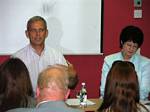
|
Home > About > Conferences > Galway 2007 > List of Papers > Abstract: Murray |
|
|
Adventurers, Emissaries and
Settlers:
Ireland and Latin America
Overview -
List of Papers -
Schedule -
Gallery |
|
|
Abstract Contrasting Histories: Discourses in Irish Latin American Studies Edmundo Murray (University of Zurich) Students of Irish Studies usually look for new research topics with a view to uncover fresh ideas that they can develop further in the future. A number of persons, events, and places related to Ireland and Latin America are potentially productive for conducting research with new methods and perspectives. The first problem in a relatively new field of study is the scarcity of primary sources. Literary students need to cope with very few published works, whether fictional or journalistic. Historians are confronted with the difficulty of unearthing primary documents in distant archives and in a number of languages. Other specialists cannot base their studies in a solid research background and schools. In addition to the shortage of sources and previous research, the study of Ireland and Latin America is strongly influenced by different cultural paradigms of class, ethnicity, gender, ideology and religion (frequently in that order). This paper is a discussion of the past and present of Irish Latin American Studies through the major discourses that have influenced the field, as well as the availability of research sources. Many of the similarities between Ireland and Latin America are purely coincidental. However, the beliefs of the people who read and interpret the facts and fiction of the relations between the two areas may have common grounds. For instance, the attacks to and the defence of a social structure hierarchically based on the possession of production means seems to be a recurrent value both in fictional and historical works. Some examples serve to illustrate the approach: the San Patricio Battalion in the U.S.-Mexico war (1846-1847), the Dresden Affair of 1889 in Argentina and Ireland, and the so-called Colombia Three case in Bogotá 2001-2005. To avoid a tedious account of all what was done and is being done in Irish Latin American Studies, and with the intention to catalogue the diversity and heterogeneity of writing and research work, I propose to develop a practical taxonomy of the different discourses that can be identified – openly or between the lines – in a number of books and articles. Therefore, starting with social classifications, we will cover studies, fiction, private writing and journalistic work and further itemize their qualities from ethnic, gender, ideology and religious perspectives. The obvious implication of this taxonomy is the organisation of the future work. I am against the idea of considering this field as a particular geographic specialisation of Irish Diaspora Studies – which is sometimes viewed itself as a part of Irish Studies – or as a section within Latin American migration studies. I envisage Irish Latin American Studies as an opportunity for students of literature, history, geography, linguistics, music, anthropology and other disciplines, with gusto for Latin America or Ireland, to cross intellectual borders and go beyond the established limits of their academic canon. |
|
|
|
|
|
Online
published: 24 April 2007 Edited: 07 May 2009 |
| The Society for Irish Latin American Studies |
Copyright Information |
|
